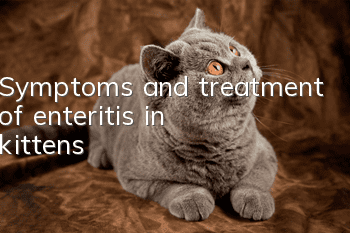Symptoms and treatment of enteritis in kittens

Symptoms of enteritis in young cats:
Enteritis in young cats will cause vomiting, depression, diarrhea, flatulence, lethargy, loss of appetite, abdominal pain, etc. They often refuse to touch because of abdominal pain, and their thirst for water increases significantly, but vomiting occurs after drinking water. Gastroenteritis, which is mainly enteritis, has diarrhea as its main symptom. The stool is liquid and has a fishy and unpleasant smell. When enteritis is severe and the intestinal mucosa bleeds, the stool will be black or black-green, sometimes mixed with blood streaks and black blood clots. In the later stages of enteritis in young dairy cats, intestinal bloating can be seen, and symptoms such as dehydration and acidosis are prone to occur. If gastroenteritis is caused by corrosive items, the vomitus often contains blood and gastric mucosal fragments.
Treatment methods for enteritis in kittens:
For mild gastroenteritis, you can choose some live bacteria such as lactase enzyme tablets, multi-enzyme tablets, lactobacillus tablets, and intestinal bacteria tablets. Functional medicine helps cats regulate the flora of their digestive tract and regulate their digestive system. Fasting is required in the early stages of treatment, otherwise repeated gastrointestinal irritation will aggravate the condition. Fasting can give the gastrointestinal tract a good rest and help the gastrointestinal mucosa slowly repair. If the cat has frequent vomiting and diarrhea, or finds that it does not improve after taking medication, it is best to send the cat to the hospital for treatment in time, and do not delay the best opportunity for treatment.
Causes of enteritis in kittens:
1. Diet, overeating, inferior and indigestible food, new food, snacks or supplements Contaminants, garbage, or foreign objects such as chocolate, mushrooms, xylitol, and other toxic household products can increase the risk of gastroenteritis.
2. Viral infections. Many types of viral, bacterial, parasitic and fungal infections can cause this health condition in your cat. Some infections include feline immunodeficiency virus, feline leukemia virus, feline parvovirus, E. coli, Clostridium, Giardia and whipworm.
3. Drug side effects. Antibiotics, steroids, non-steroidal anti-inflammatory drugs and other drugs can cause gastroenteritis attacks.
4. Organ diseases, pancreatitis, liver disease, kidney disease and gallbladder disease can cause rupture and inflammation, leading to gastroenteritis.
- How to effectively stop some bad behaviors of cats?
- What's going on with the cat running back and forth like crazy?
- What medicine should be used for red, swollen and inflamed cat nails?
- 4 common sense tips for novice cat owners
- Why do cats like to lick each other's fur?
- How to clean a shorthair cat with a towel
- How to correct a cat’s food grabbing?
- How to stop cats from going through the trash can. Owners can learn these four tricks
- What should I do if my cat doesn’t eat?
- Why do cats like to eat fish? In fact, we have all misunderstood...



